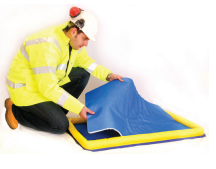PLANT NAPPY
WHAT IS IT?
Our newest product, the Plant Nappy uses patented technology to create a smarter alternative to traditional oil drip trays in particular when used in an outdoor environment.
Made in the UK, this user-friendly design ensures that no oil will spill into
the surrounding environment.
Plant Nappy is the responsible solution to leaky generators and using plant equipment outdoors - Eliminate Ground Contamination.
Plant Nappy® provides spill and leak containment for plant equipment. It is a lightweight, user-friendly means of spill containment. Plant Nappy® is the easy and cost-effective solution to ensuring environmentally friendly practice and avoiding potential prosecution or
fine for pollution of ground or water.



PRODUCT FEATURES
-
Contains spills and leaks from mobile plant in all weather conditions
-
Wall material retains pollutants while allowing CLEAN rainwater to pass through
-
Can be used on uneven ground
-
Rugged construction to withstand tough conditions
-
The tough wall material allows machinery to be wheeled into place
-
Lightweight alternative to heavy and cumbersome spill trays
-
Base material absorbs up to 6 litres per square metre of oil/fuel
-
No emptying of rainwater required
-
Fire retardant - self extinguishing
-
UV resitant - excellent resistance to fade and UV breakdown
-
Abrasion resistant
-
ISO Certified in occupational health and safety management systems, and quality management systems.
-
Liner Refills extend life of unit
-
Highly visible - demonstrates proactive approach to environmental protection
-
Available in three sizes
DESIGN
The Plant Nappy uses patented technology to create a smarter alternative to traditional oil drip trays. This user-friendly design ensures that no oil will spill into the surrounding environment.
The base of the mat is made up of a non-permeable base fabric laminated with an oil soak felt and a permeable top fabric to allow free passage of contaminants.
The side wall is made up of the same permeable fabric with a self standing and recovery structure built within a different felt type with specific properties which allows free passage of water but still retain any contaminant residue.
The design is such that any drips of oil or fuel are caught in the base structure, as rain, or water from any source falls onto the mat it is allowed to escape through the sidewall being filtered of contaminants as it leaves.



SPECIFICATIONS
TOP COVER
· Vinyl coated polyester mesh
· Abrasion resistant
· Oil & chemical resistant
· UV resistant
· High tensile strength
· Temperature resistance, -20°C to 107°C
· Melt point, 157°C
BASE MATERIAL
· Woven Olefin fabric coated with Olefin resin
· Stain, chemical, and mildew resistant
· Abrasion resistant
· UV resistant
· High tensile strength
· Temperature resistance, -20°C to 107°C
· Melt point, 157°C
ABSORBENCY
Up to 6 litres per square metre
FILL MATERIAL
· Polypropylene fibre & polyester yarn
· High ratio of oil to fabric weight adsorption
· Non toxic & non hazardous
· UV resistant
· Melt point, 135°C
AVAILABLE SIZES
PLANT NAPPY
PN1 - 500 x 685mm
PN2 - 1000 x 685mm
PN3 - 2000 x 1370mm
PN4 - 2400 x 1370mm
NAPPY LINERS
NL1 - 500 x 685mm
NL2 - 1000 x 685mm
NL3 - 2000 x 1370mm
NL4 - 2400 x 1370mm
ALSO AVAILABLE
-
Pegs for securing
PLANT NAPPY LINERS
Additional Plant Nappy Liners can be purchased for the Plant Nappy which help extend its life.
The liner sits snuggly in the base of the Nappy. Cleaning the Nappy is simple as the liner is easy to remove. To clean, squeeze out the contaminants into suitable container.
The lines can absorb up to 6 litres per square metre of oil, fuel, & hydrocarbons.

HOW IT WORKS


CREDENTIALS & TESTING
The environmental credentials of the Plant Nappy speak for themselves, with Plant Nappy made a mandatory requirement during construction of the London Olympics site and written into the Olympic Development Committees Health and Environmental Guidelines.
The Plant Nappy also won the Queens Award for enterprise innovation in 2018.
Rigorous testing ensures our products offer the highest qualities to our customers.
421
Prototypes
100,034
Hours of testing
120,000
Instances of environmental protection






